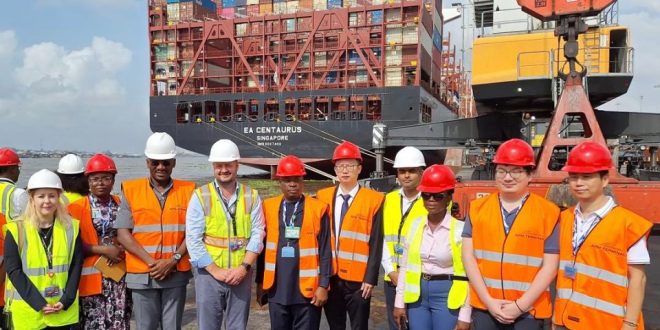Lagos Port Complex, Apapa, has made history with the arrival of the largest container vessel ever to berth in Nigeria, the EA Centaurus, a massive vessel with a capacity of 7,000 twenty-foot equivalent units (TEUs).
In a statement issued on Thursday, APM Terminals Apapa, the operator of the terminal, confirmed that the vessel’s arrival marks a new milestone for Nigeria’s premier port, setting the stage for a new era of increased maritime capacity and trade.
The EA Centaurus, owned by COSCO Shipping and registered under the Singaporean flag, is a colossal ship measuring 272 meters in length, 43 meters in width, and a draft of 14.3 meters. The vessel’s ability to carry 7,000 TEUs signifies a significant leap in the type of ships that Nigeria’s ports can now accommodate.
In his remarks at the official welcoming of the ship, Steen Knudsen, the Terminal Manager at APM Terminals Apapa, highlighted the economic impact of handling such a large vessel. He noted that accommodating larger ships is a game-changer for Nigeria’s port operations, offering several operational benefits.
“Larger vessels mean more efficient economies of scale, which ultimately help reduce the cost of imports to Nigeria,” Knudsen explained. “This milestone reflects Nigeria’s growing trade capacity and APM Terminals’ commitment to supporting this growth.”
Knudsen added that by consolidating more cargo on a single vessel, the port is improving operational efficiency, which translates to lower freight costs for importers. This reduction in import costs is expected to have a direct, positive impact on Nigeria’s economy by fostering stronger trade relations and boosting economic activity.
Caroline Aubert-Adewuyi, the Chief Commercial Officer of APM Terminals Nigeria, emphasized the significance of the partnership between APM Terminals and COSCO Shipping, which she described as a crucial step forward for Nigeria’s trade infrastructure.
Aubert-Adewuyi stated, “The arrival of the EA Centaurus marks a new level of cooperation between APM Terminals and COSCO Shipping. We are excited about the positive impact this will have not only on Nigeria’s economy but also on our customers and trade partners.”
The Managing Director of COSCO Shipping Lines Nigeria, Rex Wang, also spoke on the strategic importance of the vessel’s arrival, calling it a historic moment for the company in West Africa. He noted that the EA Centaurus is the largest vessel COSCO has handled in the region, underscoring the expansion of their services across West Africa.
Wang said, “This event is a significant milestone for COSCO, marking a deeper investment in the West African market. We are optimistic about the economic recovery in the region, particularly with the expected rise in exports like minerals, sesame seeds, and cashews. We believe this will strengthen trade links between Africa, Asia, and other global markets.”
The Customs Area Controller at Apapa Command, Comptroller Babatunde Olomu, also praised the event, reaffirming the Customs Service’s commitment to ensuring swift and efficient processing of cargo.
Olomu expressed, “The arrival of this vessel highlights our continued commitment to the seamless handling of large shipments. We will ensure that this milestone is not just celebrated but also translates into faster processing times, which will further enhance Nigeria’s position as a top trading hub in Africa.”
COSCO Shipping, headquartered in China, is one of the world’s largest shipping companies, with an extensive fleet operating in major ports across the globe. The company has been actively expanding its presence in West Africa, and the arrival of the EA Centaurus at Apapa further solidifies its commitment to the region’s growing importance in global trade.
The entry of larger vessels such as the EA Centaurus into Nigeria’s port system is a clear signal of the country’s readiness to handle more significant volumes of trade, which in turn will help improve Nigeria’s position as a central player in global maritime trade.
With this development, Lagos Port Complex is poised to further cement its place as one of Africa’s leading ports, as it continues to attract larger vessels and facilitate more trade.
 National Telescope national telescope newspaper
National Telescope national telescope newspaper



